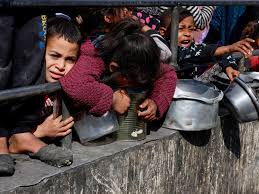UNICEF: One million children in Gaza are at risk of death due to the blockade of humanitarian aid.

The United Nations Children's Fund (UNICEF) reported that over a million children in Gaza have been continuously deprived of vital humanitarian aid for over a month.
This was stated in a press release by the organization on Saturday, April 5, confirming that the region is experiencing the longest period of aid blockade since the conflict began, with no humanitarian aid allowed in since March 2, 2025.
The statement highlighted a severe crisis in providing essential supplies such as food, clean water, shelter, and medical necessities due to this blockade.
The organization warned of serious consequences if this situation continues, anticipating a significant rise in malnutrition rates and preventable diseases, leading to an increase in avoidable child deaths.
Edward Beigbeder, UNICEF Regional Director for the Middle East and North Africa, emphasized that the organization has large quantities of humanitarian aid ready for distribution, cautioning that delays in delivery pose serious risks.
Beigbeder stated, "This life-saving aid remains stuck in warehouses instead of reaching those in urgent need," considering that "providing this aid is not just a voluntary humanitarian act, but a legal obligation under international laws."
The statement stressed that the continued prevention of humanitarian aid reaching Gaza constitutes a blatant violation of international humanitarian law, with serious repercussions threatening children's lives in particular.
The organization also pointed out that the blockade on aid has reached a critical stage, revealing that the ready-to-use infant milk supply in the region is now only sufficient for 400 children for just one month, warning that children suffering from malnutrition are at imminent risk due to the crisis.
Beigbeder concluded by saying, "We urge the authorities to fulfill their legal and international obligations towards over a million children in Gaza, and to work on providing the minimum essential needs for the population, including food, medicine, and other necessary supplies to ensure their survival."